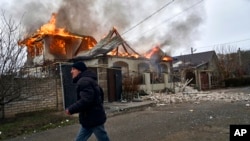The United States will provide a military aid package worth more than $3 billion to Ukraine and other countries affected by Russia's invasion of Ukraine, U.S. Secretary of State Antony Blinken announced Friday.
The military aid could help Ukrainian forces "change the dynamic on the battlefield," Deputy Assistant Secretary Laura Cooper told Pentagon reporters.
During the Pentagon briefing, reported VOA's National Security Correspondent Jeff Seldin, U.S. officials warned that they saw no evidence Putin would ease up on his efforts to seize control of Ukraine and expressed skepticism about a Russian cease-fire called in observance of the Russian Orthodox Christmas.
"This is the same man [Putin] who said he would not invade Ukraine," Cooper said. "I can tell you we see fighting today in Ukraine, even though technically we're in the cease-fire window."
White House National Security Council spokesman John Kirby echoed those sentiments. "They've been on the offense every single day for the last 10 months, trying to take away Ukrainian lives, Ukrainian civilian infrastructure and certainly Ukrainian territory," he said.
Cooper added that despite difficult winter weather, the fighting in some areas, like in the Donbas in eastern Ukraine, has become even more vicious.
"I think you will see Russian forces trying to advance … sending wave upon wave of forces to try to gain what ends up being very marginal territorial gains," Cooper said.
It's expected that the aid package, which will include 50 Bradley Fighting Vehicles, 500 TOW anti-tank missiles and additional ammunition, will help Ukrainian forces gain an advantage in the east, where much of the fighting is now taking place across open spaces and farmland.
Still, the Pentagon said, it will take a couple of months to get Ukrainian forces the necessary training and then move the Bradleys into Ukraine.
Officials also defended the decision to wait until now to provide Ukraine with the Bradleys and other armored vehicles, saying that until now, Ukrainian forces needed other weapon systems more and that they would not have been capable of doing the necessary maintenance.
U.S. President Joe Biden first announced that Bradleys would be included in the new package, a statement the Pentagon confirmed later Thursday.
"It's not a tank, but it's a tank-killer," Pentagon press secretary Brigadier General Pat Ryder told reporters. "It will provide a significant boost to Ukraine's already impressive armored capabilities, and we're confident that it will aid them on the battlefield."
Germany and France also are sending armored vehicles, the two countries announced this week.
In addition, Germany will match the U.S. in sending Ukraine a Patriot missile battery for defense, the White House said Thursday. Training to use the Patriots, which former officials said would take months to complete, is being finalized.
"We're exploring a variety of options, to include potential training here in the U.S., overseas or a combination of both," Ryder told reporters at the Pentagon.
The Patriot is the most advanced surface-to-air missile system the West has provided to date to help repel Russian aerial attacks.
In his nightly video address Friday, Ukrainian President Volodymyr Zelenskyy responded to the military aid package, saying: "Finally, we can say that we have managed to bring Ukraine's strength and defense cooperation with partners to a new level, the one we really need right now.
"Now, our soldiers will have even more weapons, equipment, rounds, defense systems, which will make us much more prepared for any escalating plans of Russia and those strikes that the terrorist state inflicts, regardless of whether it is a holiday or a weekday."
'What cease-fire?'
An uneasy calm in Kyiv was broken earlier Friday by air-raid sirens that also blared across the rest of Ukraine despite the 36-hour cease-fire.
"What cease-fire? Can you hear?" said a Ukrainian soldier, using the nom de guerre Vyshnya, as an explosion rang out in the distance at the front line near Kreminna in eastern Ukraine. "What do they want to achieve if they keep on shooting? We know – we have learned not to trust them."
Russia's Defense Ministry said its troops began observing the cease-fire at noon Moscow time (0900 GMT) "along the entire line of contact" but said that Ukraine had kept shelling populated areas and military positions.
One witness in the Russian-occupied regional capital of Donetsk, close to the front, also described outgoing artillery fired from pro-Russian positions on the city's outskirts after the truce was meant to take effect.
The Ukrainian governor of the front-line eastern Luhansk province, Serhiy Haidai, said that in the first three hours of the purported cease-fire the Russians had shelled Ukrainian positions 14 times and stormed one settlement three times.
Russia's Defense Ministry alleged that Ukrainian forces continued to shell its positions, and said its forces returned fire to suppress the attacks. But it wasn't clear from the statement whether the attacks and return of fire took place before or after the cease-fire was to have taken effect.
The ministry's spokesman, Igor Konashenkov, reported multiple Ukrainian attacks in the eastern Donetsk, Luhansk and Zaporizhzhia regions. It was not possible to verify the claims.
Ukrainian and Western officials said they suspected an ulterior motive in Putin's apparent goodwill gesture.
Zelenskyy accused the Kremlin of planning the fighting pause "to continue the war with renewed vigor."
"Now they want to use Christmas as a cover to stop the advance of our guys in the [eastern] Donbas [region] for a while and bring equipment, ammunition and mobilized people closer to our positions," Zelenskyy said late Thursday.
Biden echoed Zelenskyy's wariness, saying it was "interesting" that Putin was ready to bomb hospitals, nurseries and churches in recent weeks on Christmas and New Year's.
"I think [Putin] is trying to find some oxygen," Biden said.
VOA National Security Correspondent Jeff Seldin contributed to this report. Some information came from The Associated Press and Reuters.




